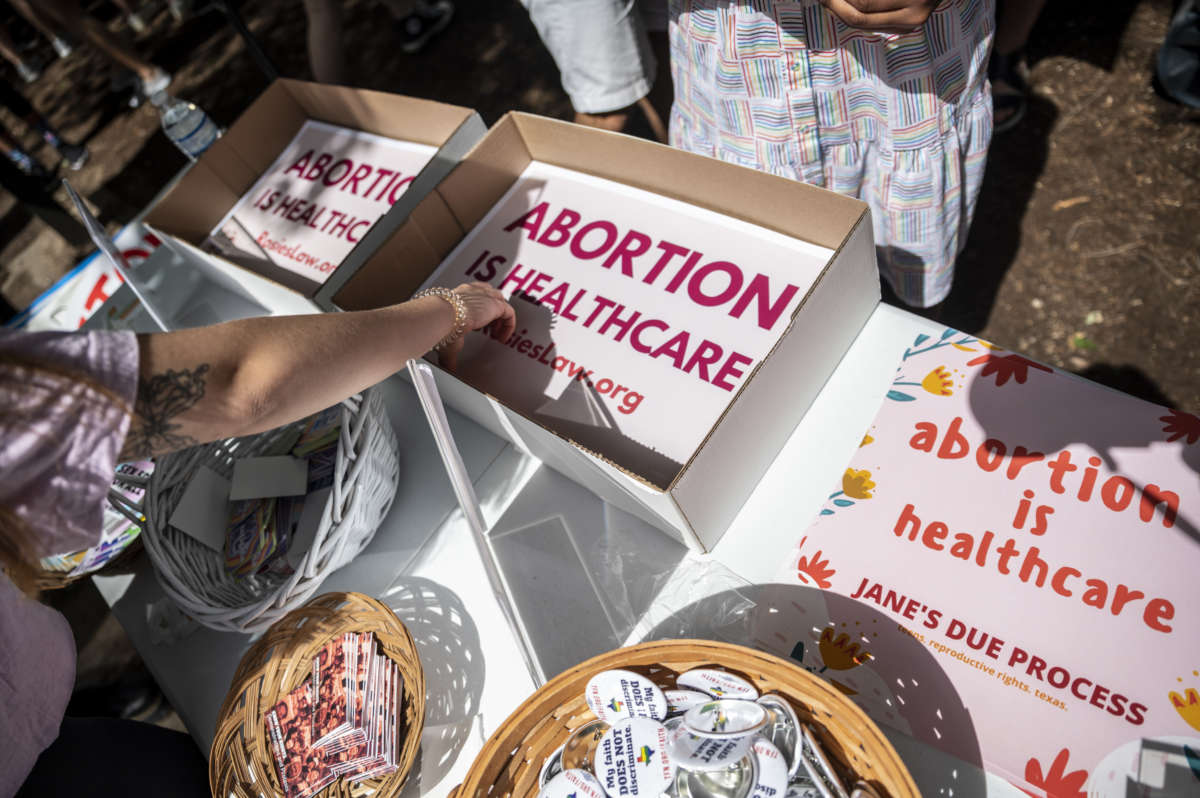Truthout is an indispensable resource for activists, movement leaders and workers everywhere. Please make this work possible with a quick donation.
After a law restricting nearly all abortions went into effect in Texas on Wednesday, progressives began reigniting a call to expand the Supreme Court, saying “millions of lives are at stake.”
The law is the most restrictive abortion law in the U.S., to the point where experts have said that it essentially overturns Roe v. Wade in the state. The law went into effect after the Supreme Court didn’t act in rejecting it, as they were expected to do.
Progressives and Democrats have decried the tacit upholding of the law, ripping into the conservative-dominated Supreme Court for its inaction.
Lawmakers like Sen. Ed Markey (D-Massachusetts) and Representatives Jamaal Bowman (D-New York) and Mondaire Jones (D-New York) said that the Supreme Court must be expanded in order to fight against and overturn actions by the right-wing justices to undermine abortion and voting rights.
“By refusing to take action before the clock struck midnight, the far-right Supreme Court effectively overturned Roe v. Wade. This isn’t hypothetical — our fundamental rights are being snatched away from under us. We must #ExpandTheCourt,” wrote Jones.
“Has your member of Congress signed on to the Judiciary Act of 2021, which would add four seats to the Supreme Court? If not, what are they waiting for?” Jones wrote in a follow-up tweet, urging followers to call their representatives.
“We must expand and reform the Supreme Court. Millions of lives are at stake,” wrote Bowman. He said the expansion is about several issues at once, saying “It’s abortion rights. It’s voting rights. It’s workers’ rights. It’s civil rights.” and reiterated that adding justices to the Supreme Court is “a matter of life and death” in the tweet.
Rep. Alexandria Ocasio-Cortez retweeted a criticism of the current Supreme Court from Mother Jones reporter Ari Berman, saying “A Supreme Court where 5 of 6 conservative justices were appointed by GOP presidents who initially lost popular vote and confirmed by senators representing minority of Americans are taking away voting rights and reproductive rights from millions of Americans. This is not democracy.”
Earlier this year, Democrats introduced legislation to add four more justices to the highest court in the land. Introduced by Jones, Markey, and others, the lawmakers and progressives argued that it’s necessary to fight back against Republicans, who have essentially rigged the court in their favor.
Congress has the authority to decide how many justices sit on the Supreme Court. However, the bill currently only has 28 cosponsors in the House and no cosponsors in the Senate.
Rescinding abortion rights, which are under threat on a national level with the current Supreme Court, would have an enormous impact on pregnant people and their families. It would also, as Rep. Cori Bush (D-Missouri) pointed out, be especially pernicious for Black and brown people, as well as poor people.
“I’m thinking about the Black, brown, low-income, queer, and young folks in Texas. The folks this abortion health care ban will disproportionately harm,” tweeted Bush. “Wealthy white folks will have the means to access abortion care. Our communities won’t.”
Abortion bans affect nearly everyone, but they harm people of color and poor people the most. People of color are disproportionately criminalized by abortion bans and poor people don’t have the same access to health providers or the resources to travel to places that do provide abortions legally as wealthy people do. When a pregnancy is causing harm or will cause harm to a pregnant person, abortion bans leave disadvantaged populations with nowhere to turn.
Some lawmakers called for passing legislation through Congress that would protect abortion rights. Rep. Barbara Lee (D-California) called on the passage of a bill last introduced in 2019 that would prevent states from rescinding abortion access or limit access to the vital health care. “We will fight this in Congress with every tool available,” Lee vowed.
A terrifying moment. We appeal for your support.
In the last weeks, we have witnessed an authoritarian assault on communities in Minnesota and across the nation.
The need for truthful, grassroots reporting is urgent at this cataclysmic historical moment. Yet, Trump-aligned billionaires and other allies have taken over many legacy media outlets — the culmination of a decades-long campaign to place control of the narrative into the hands of the political right.
We refuse to let Trump’s blatant propaganda machine go unchecked. Untethered to corporate ownership or advertisers, Truthout remains fearless in our reporting and our determination to use journalism as a tool for justice.
But we need your help just to fund our basic expenses. Over 80 percent of Truthout’s funding comes from small individual donations from our community of readers, and over a third of our total budget is supported by recurring monthly donors.
Truthout has launched a fundraiser, and we have a goal to add 231 new monthly donors in the next 48 hours. Whether you can make a small monthly donation or a larger one-time gift, Truthout only works with your support.
